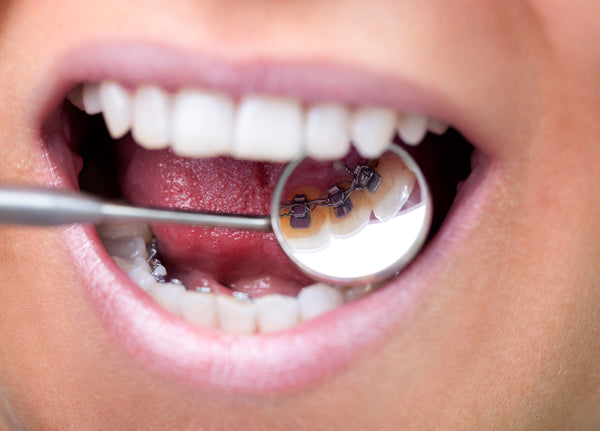
If you are beginning your journey into the world of orthodontic treatment, it can be an overwhelming place to start. There are several braces out there on the market today, all different. From your traditional fixed metal braces to self-ligating braces, to the hidden braces including ceramic and clear aligners.
While ceramic braces are fixed and act in the same way as a traditional brace, they are much less noticeable, and clear aligners are even less so, but you have the added worry of removing and replacing them several times a day.
There is an alternative in the form of Lingual braces. This type of brace is possibly the most discreet and we are going to investigate just how fantastic this type of orthodontic treatment can be.
What Exactly Are Lingual Braces?
A lingual brace is a traditional fixed brace that sits behind the teeth, making them even less visible than other types of discreet braces. Like the traditional fixed metal braces, they consist of brackets that are attached to the backs of your teeth which are attached by a metal wire used by your orthodontist to adjust and create the movement that is desired.
Although extremely discreet, they can take some getting used to, as the space behind our teeth is limited, adding the brackets and wires to it can make talking and eating difficult at first, but as with all types of braces, they don’t take long to get used to.
How Are Lingual Braces Fitted?
Your orthodontist will take impressions of your teeth, a dental lab then uses them to make customised brackets for the patient's mouth. The brackets are then fitted behind each tooth and a metal wire is attached and over time, teeth will shift into their desired alignment.
Could Lingual Braces Work for Me?
Lingual braces work well for adults and children but can be particularly suitable for adults who feel self-conscious about going through orthodontic treatment. If you have overcrowded, crooked, or gappy teeth, then Lingual braces could be the ideal solution to fix your smile discreetly.
Treatment length varies on the severity of the corrections needed but the average duration of treatment ranges from 18 to 36 months, which is slightly longer than traditional metal braces.
Advantages of Lingual Braces
- The latest technology in lingual braces features custom-made brackets which enable orthodontists to achieve excellent control over the precise movements of each tooth, making them a desirable product for simple problems like gappy teeth up to severely crowded teeth or teeth that don’t bite together properly.
- Lingual braces are extremely discreet, meaning that when you smile, talk, or eat, it’s very difficult for anyone other than your orthodontist to tell you’re wearing them.
- No worry of possible staining once your brackets are removed, as with traditional metal braces that are fixed to the front of your teeth. If some staining does occur, it will be conveniently hidden on the backs of your teeth.
Disadvantages of Lingual Braces.
- Lingual braces can often be more expensive than traditional braces or clear aligners due to the length of treatment and adjustments that need to be made. The custom-made nature of these braces (including the Incognito which we offer at our practice in Oldham) and the clinicians fitting them may need to undergo dedicated training to learn the technique, which can also mean that adjustment appointments can take longer.
- There is less room behind your teeth than in front, which means that soreness and irritation can occur to your tongue and underneath it. It shouldn’t take long to get used to and for the soreness to subside, but whilst you are adjusting you can use special wax to put on any parts that are particularly painful.
- Due to the fitted nature of lingual braces, the same rules apply to traditional metal braces with food and drink. With removable braces, you can eat and drink most things if you clean your teeth before refitting, but with lingual braces, it is advisable to stay away from hard, crunchy, chewy, and crusty foods that will likely break your brackets or wires.
- It is also possible to develop a lisp with a lingual brace, due to your tongue needing to adjust to the lack of room in your mouth. This shouldn’t last for more than a few days and the more you talk, the quicker you will adjust, and your lisp should disappear.
Speak to Your Friendly and Knowledgeable Orthodontist in Oldham about your Options
Here at Oldham Orthodontics, your local, expert orthodontist in Oldham, we have years of experience in fitting and adjusting lingual braces. We offer a wide range of the latest orthodontic treatment to help children and adults gain beautiful, straight smiles.
Our chosen brands for lingual braces include Incognito which are custom made from gold and ensure an exact fit to your teeth. The Incognito produces fast and predictable results and is less likely to lead to problems such as decalcification and decay than traditional braces.
If you would like to find out more about our lingual braces or any other orthodontic treatment, speak to one of our friendly team at your local orthodontist in Oldham today. Oldham Orthodontics is here to help you get the smile you desire.
